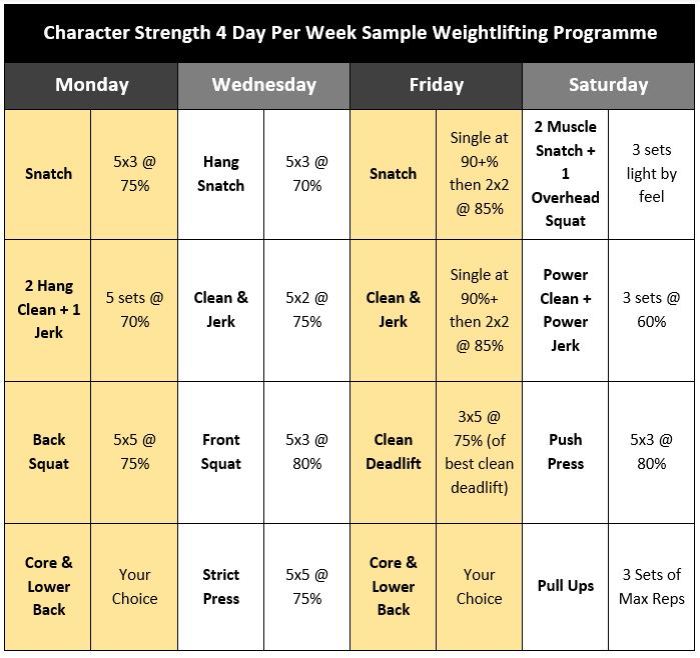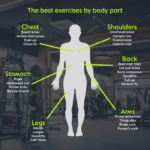Weight Lifting Programs For Strength: Building a powerful physique requires more than just lifting weights; it demands a strategic approach encompassing meticulous program design, proper form, and a commitment to progressive overload. This guide delves into the science and art of crafting effective weightlifting routines, catering to various experience levels and goals, from beginner strength building to advanced techniques for maximizing gains.
We’ll explore the fundamentals of exercise selection, periodization strategies for optimal results, and the critical role of nutrition and recovery in supporting muscle growth and preventing injury. Whether you’re aiming to increase overall strength, target specific muscle groups, or overcome training plateaus, this comprehensive resource provides the knowledge and tools to achieve your fitness aspirations.
Nutrition and Recovery for Strength Building: Weight Lifting Programs For Strength

Optimizing nutrition is paramount for maximizing strength gains and ensuring efficient recovery from intense weightlifting sessions. A well-structured diet provides the necessary building blocks for muscle growth, replenishes energy stores depleted during workouts, and supports the body’s repair processes. Ignoring this crucial aspect can significantly hinder progress, leading to plateaus and increased risk of injury.Adequate protein intake is the cornerstone of muscle growth and repair.
Protein provides the amino acids necessary for synthesizing new muscle tissue and repairing microscopic tears that occur during weight training.
Protein Intake for Muscle Growth and Repair
Consuming sufficient protein is critical for muscle protein synthesis, the process by which your body builds and repairs muscle tissue. The recommended daily protein intake for strength athletes varies depending on factors like training intensity, body weight, and individual metabolic rate, but generally ranges from 1.6 to 2.2 grams of protein per kilogram of body weight. For example, a 70kg individual should aim for 112-154 grams of protein daily.
High-quality protein sources include lean meats (chicken, turkey, fish), eggs, dairy products (Greek yogurt, cottage cheese), and legumes (lentils, beans). Strategically timing protein intake, such as consuming a protein-rich meal or shake post-workout, can further optimize muscle recovery and growth.
The Role of Carbohydrates and Fats in Fueling Workouts and Recovery
Carbohydrates serve as the primary energy source for high-intensity weightlifting workouts. They are broken down into glucose, which fuels muscle contractions. Adequate carbohydrate intake ensures sufficient energy levels throughout training sessions, preventing premature fatigue and maximizing performance. Complex carbohydrates, such as brown rice, quinoa, oats, and sweet potatoes, provide sustained energy release, unlike simple sugars which lead to energy crashes.Fats, often misunderstood, play a crucial role in hormone production, nutrient absorption, and overall health.
They provide essential fatty acids, which support various bodily functions, including muscle growth and recovery. Healthy fats, found in sources like avocados, nuts, seeds, and olive oil, should be incorporated into the diet. They also aid in the absorption of fat-soluble vitamins and contribute to satiety, helping manage overall calorie intake.
Sample Meal Plan for Strength Training, Weight Lifting Programs For Strength
This sample meal plan provides a framework for a strength athlete’s nutrition. Individual needs may vary depending on factors such as training volume, body composition goals, and individual preferences. Calorie and macronutrient targets should be adjusted accordingly.
| Meal | Food | Approximate Macronutrient Composition (Example) |
|---|---|---|
| Breakfast (7:00 AM) | Oatmeal with berries and nuts, Greek yogurt | 40g Carbohydrates, 30g Protein, 10g Fat |
| Mid-Morning Snack (10:00 AM) | Apple slices with almond butter | 20g Carbohydrates, 5g Protein, 15g Fat |
| Lunch (1:00 PM) | Chicken breast salad with quinoa and mixed vegetables | 50g Carbohydrates, 40g Protein, 15g Fat |
| Pre-Workout Snack (4:00 PM) | Banana with peanut butter | 30g Carbohydrates, 10g Protein, 10g Fat |
| Post-Workout Meal (6:00 PM) | Lean steak with sweet potato and broccoli | 60g Carbohydrates, 50g Protein, 20g Fat |
| Dinner (9:00 PM) | Salmon with brown rice and asparagus | 40g Carbohydrates, 35g Protein, 25g Fat |
Proper hydration is also essential. Aim for consistent water intake throughout the day, especially during and after workouts.
Mastering the art of weightlifting is a journey of continuous learning and adaptation. By understanding the principles of progressive overload, prioritizing proper form, and fueling your body with the right nutrients, you can unlock your strength potential. Remember that consistency, patience, and a willingness to adjust your program based on individual progress are key to long-term success. Embrace the challenge, track your results, and celebrate your achievements along the way – the rewards of a stronger, healthier you are well worth the effort.

